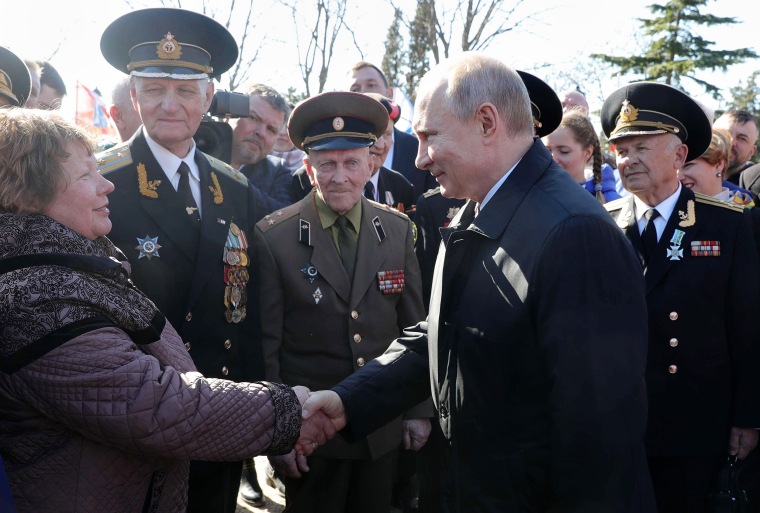Five years after annexing Crimea from Ukraine, Russian President Vladimir Putin has celebrated the March 18 takeover by visiting the Black Sea peninsula with great pomp, enveloped in patriotic propaganda. But for many in Russia, watching the festivities was like a scene from “Mad Max: Fury Road” — while the glory is ballyhooed, the reality is scant.
Though the annexation originally gave Putin a large jolt of popularity — the continual “Russia is great” rhetoric is now mostly exhausted. Serious political and economic crises are fast approaching. The nation’s resources have been depleted, and Putin’s “us against the world” version of the Russian future is proving unpopular. Five years after Crimea, people aspire to a normal, not “heroic,” life.
History should teach every authoritarian that nationalism doesn’t last forever, because rhetorical greatness cannot pay the bills.
History should teach every authoritarian that nationalism doesn’t last forever, because rhetorical greatness cannot pay the bills. Though the West’s post-annexation sanctions forced Russian entrepreneurship to come to the fore, in the past five years Russia’s disposable incomes have fallen for several years in a row. Eventually, people begin to care more about what is in their fridge than the pageant of Red Square parades.
SIGN UP FOR THE THINK WEEKLY NEWSLETTER HERE
To review: In 2014, bloody protests broke out in Kiev against President Victor Yanukovych’s Ukrainian government, which had canceled an economic agreement with the European Union in favor of closer ties to Moscow. Even as Yanukovych fled to Russia, the Kremlin orchestrated a bloodless, but forceful, paramilitary takeover of the Crimean Peninsula. This region had been part of the Russian Empire for centuries — Russians consider it the Christian birthplace of what used to be known as Kievan Russia, a proto-state of Russia and Ukraine. But the Soviet Union had attached Crimea to its Ukrainian republic for managerial purposes, and they remained linked when the U.S.S.R. collapsed. Russians always fretted about their loss of Crimea, and — fast forward 60 years — when Putin returned it to the Russian fold, his then-waning popularity shot from 60 to nearly 90 percent.
The president needed a bold move. After years of parading bare-chested across Siberia, swimming with dolphins and posing with rockets, his stunts had begun to feel stale. The country was sliding economically, and Russians were looking for a brighter future. In 2012, Putin’s third presidential term had been met with mass protests. The Kremlin settled on a strong-hand foreign policy to make up for domestic shortcomings.
It worked. When the West issued sanctions against Russia, restricting finances for its businesses and specific officials, Putin’s standing got better, not worse. Opposition to the Kremlin’s harsh policies — controlling TV, intimidating opponents by legal and financial means, arresting political challengers — had been going strong in the early 2010s, but weakened because the sanctions ignited a surge in nationalism.
To hit back at the West, the Kremlin imposed counter-sanctions. At first, the loss of Italian prosciutto, French cheese and Polish carrots looked disastrous. But it brought unintended consequences — boosting Russian agriculture. The country has become a formidable exporter of grain, turning the once-neglected sector around.
Meanwhile, big construction projects — such as the bridge over the Kerch Strait connecting Russia’s and Crimean territory — as well as major oil and arms sales helped Russia’s gross domestic product grow by a modest two percent in 2018.
Though this enabled the regime to remain afloat, it did little to benefit people’s personal finances. Moreover, in order to shore up government finances, the Kremlin adopted unpopular pension reform last summer. It also hiked taxes for most citizens — while sparing those oligarchs close to power.
Russians poured into the streets in protest. But the state only doubled down on constricting people’s rights — perhaps because it counted on the coming Crimea anniversary to re-ignite patriotism.
So, the Kremlin piled on yet more restrictions. Until recently, for example, the internet had remained a relatively free space for dissent and debate. But the government just passed a new law against “fake news” and has argued for creating a “sovereign internet,” following the Chinese example. By separating Russia’s internet from the world-wide web, Moscow aims to limit access, making it easier to target information that undermines the authorities. As in Soviet times, any criticism of the government can now be criminalized.
With this censorship and repression, Putin follows Joseph Stalin’s model of walling off the Soviet Union.
With this censorship and repression, Putin follows Joseph Stalin’s model of walling off the Soviet Union by building socialism in one separate country. In trying to build “sovereign” capitalism, Putin defeats the purpose of the free market — the flow of goods and services — which does not function in isolation.
The increasing limits on global access and upward mobility are what now spark Russian discontent. The public is weary of the Kremlin’s efforts to foster worldwide divisiveness and animosity. Five years after Crimea, Russians no longer want to threaten — or annex — the world. They want to engage with it. This was evident during the World Cup last summer, when the Russian people discovered that friendship was a better currency than fighting.
In fact, Putin’s law targeting opposition media and bloggers to block “fake news,” serves to undermine the authority of the authorities even more. How insecure they must be if they fear a critical Facebook re-post.
Such actions make people less obedient, not more. Thousands protested pension reform in the fall. And in recent weeks, tens of thousands more went to the streets to defend their virtual freedoms. “If my online life is in jeopardy,” my 22-year old nephew told me, “I will defend it with my actual life.”
The bad news for Putin is that five years after Crimea, there is no new Crimea to spur his popularity anew.

